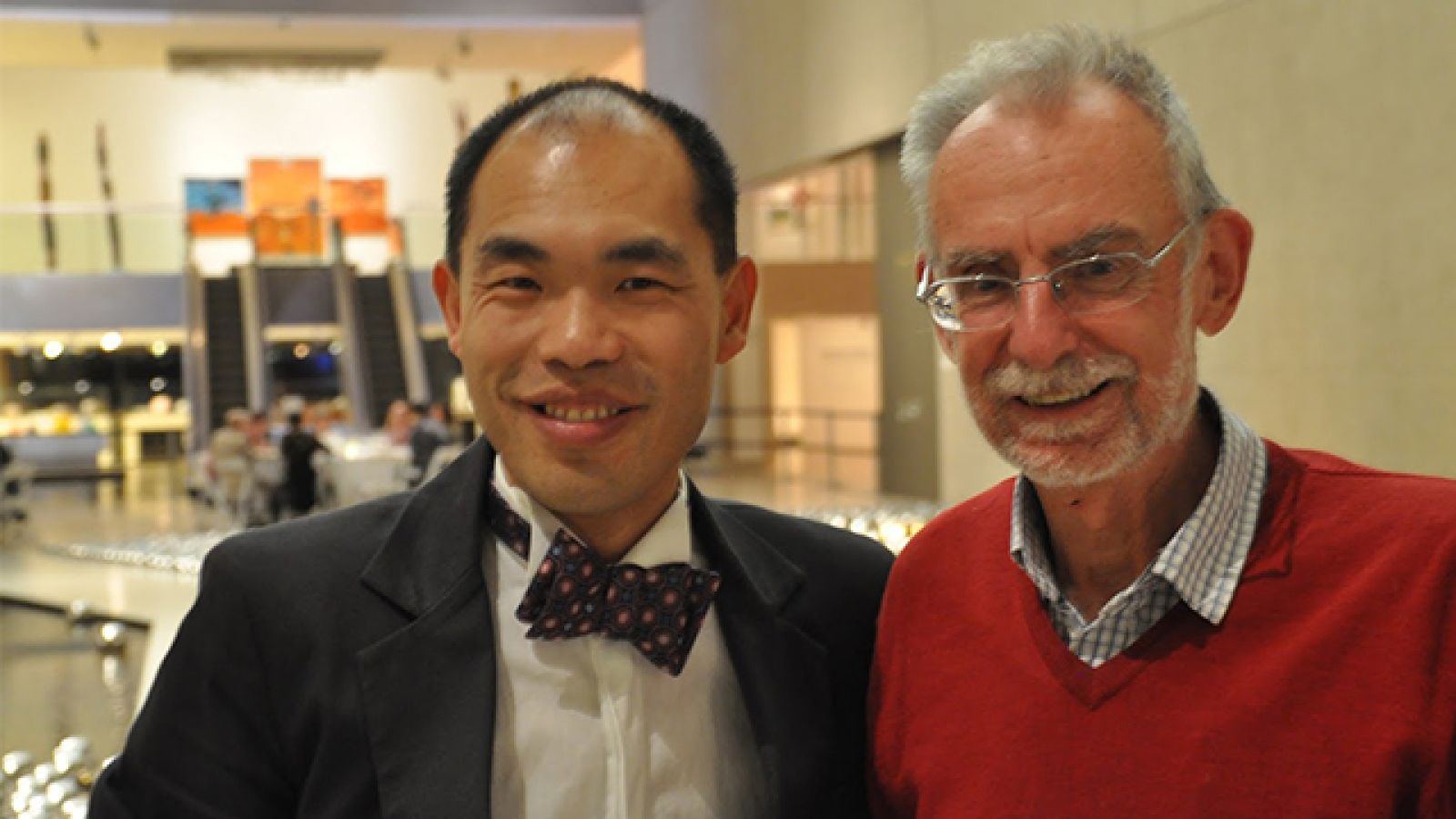ANU Emeritus Fellow wins international translation award for work in multiple languages

Dr Kevin Windle (right) with Henry Liu, outgoing president of the International Federation of Translators. Image: Jørgen Christian Wind Nielsen
An Emeritus Fellow with the ANU School of Literature, Languages and Linguistics has been recognised as one of the world’s most outstanding translators of non-fiction writing.
Dr Kevin Windle, who has translated works from nearly a dozen different languages, was awarded the Aurora Borealis Prize for the Translation of Non-Fiction by the International Federation of Translators, which represents over 80,000 translators worldwide at its recent Congress.
Dr Windle says he feels hugely honoured to have won the award, which recognises his work as translator of books, articles and plays. He adds that translators are traditionally supposed to be invisible and that the act of translation only gets noticed when something goes wrong.
“This prize recognizes a body of work from various languages over many years and has the bonus of being international,” he says. “So it’s very pleasing.”
On how he came to work with so many languages, the former Head of School and Convenor of Translation Studies and Russian says: “Any English-speaker who has studied Russian is likely to have cut his or her linguistic teeth on the more familiar languages of Western Europe, as I did, with French, Spanish and Latin at school in England.”
When he was a PhD student at McGill University in Canada, he was required to develop a reading knowledge of other Slavonic languages, including Polish, Czech and Ukrainian.
“Later, for research purposes, I needed some German, Italian and Portuguese. And out of idle curiosity I also acquired some knowledge of Modern Standard Arabic, but I wouldn’t presume to translate from it.”
According to Dr Windle, a translator, unlike an interpreter, doesn’t need to be a fluent speaker of the source language. What is needed is a reading knowledge of both languages at a high level as well as the ability to write well in the target language, in a variety of genres.
“For publication, most of us translate only into our mother tongue. I translate only into English,” Dr Windle says. “I would not attempt to translate into Ukrainian or Macedonian, for example, but I have when required translated from those languages into English.”
Another necessity is familiarity, or willingness to become familiar, with the subject area of the work to be translated.
“Projects I’ve worked on for Oxford University Press and other publishers have involved fields as different as the archaeology of Troy, the history of the Celtic peoples, literary biography, exploration of the Pacific, ornithology in 19th-century Russia and the Communist International, as well as linguistics,” Dr Windle says.
“The authors were specialists in those fields and used the terminology and forms of language appropriate to them. The translations would not be acceptable if they gave the impression – by ill-chosen wording and phrasing – that they were made by a non-specialist.”
What Dr Windle enjoys most about the work of translation is being part of the creative process. He also finds it satisfying when he can find solutions where the languages offer no direct or simple equivalents.
“That apart, it’s often been said that translating is excellent training in writing, and some novelists in the past, such as Dostoevsky, have honed their skills by translating the work of others,” Dr Windle says. “I’m no Dostoevsky, but writing, of a kind, is an essential skill for an academic. I’ve been learning it for a long time; I’m still learning.”
Dr Windle is something of a second-generation translator. He mentions his late mother, whom he describes as a very competent linguist.
“Her skills in German were put to use in wireless interception during the Second World War,” Dr Windle says. “She always encouraged me in my language studies, so in a way the prize is a tribute to her.”
Are you interested in studying a Master of Translation at ANU? More details available here.